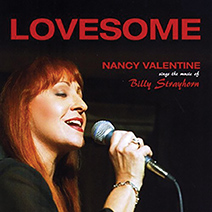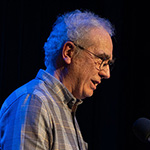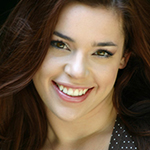Nancy Valentine
Lovesome
Nancy Valentine Sings the Music of Billy Strayhorn
February 16, 2017
Reviewed by Marilyn Lester for Cabaret Scenes
 Jazz singer Nancy Valentine has had a long history and wealth of experience performing—just not on record. At long last she’s committed her talent to permanence with Lovesome: Nancy Valentine Sings the Music of Billy Strayhorn, her debut jazz album, begging the question, “What took so long?” She has a fine, port-wine voice, with comprehensively excellent musicality. For Lovesome, she’s gathered terrific musicians who help her turn out a product with superb, top-notch production values most pleasing to the ear.
Jazz singer Nancy Valentine has had a long history and wealth of experience performing—just not on record. At long last she’s committed her talent to permanence with Lovesome: Nancy Valentine Sings the Music of Billy Strayhorn, her debut jazz album, begging the question, “What took so long?” She has a fine, port-wine voice, with comprehensively excellent musicality. For Lovesome, she’s gathered terrific musicians who help her turn out a product with superb, top-notch production values most pleasing to the ear.
Lovesome is a love letter to music genius Billy Strayhorn, best known as Duke Ellington’s colleague: “my right arm, my left arm, all the eyes in the back of my head, my brainwaves in his head, and his in mine,” according to Ellington. Yet Strayhorn had a strong personal, musical presence, which Valentine acutely understands and appreciates. She was introduced to “Swee’ Pea” (Billy’s nickname in the Ellington organization) by pianist John di Martino, who introduced the singer to “A Flower Is a Lovesome Thing,” and suggested she record an album of Strayhorn songs. On this recording, Valentine has selected 12 numbers—including many of Strayhorn’s lesser-known works—backed by 14 A-list musicians in various combinations on each of the tracks, arranged by di Martino and Tamir Hendelman.
The title song, “A Flower Is a Lovesome Thing” is a moody piece, originally conceived as wistful and dreamy. This iteration tips into the dirge-like, but nonetheless is a showcase for Valentine’s vocal control. By contrast, “You Better Know It” (music and lyrics with Duke Ellington), “Oo, You Make Me Tingle,” with its Latinized beat, and “Maybe,” are upbeat numbers with excellent, fresh, contemporary arrangements. Valentine grew up with music, was influenced by Sarah Vaughan, and wound up singing rock, performing in show bands and doing session work before committing to jazz. She also plays the trumpet and, like so many jazz vocalists who have some kind of experience with the horn, incorporates this playing technique into her singing style. This inclination to trumpet emulation is especially apparent in “U.M.M.G. (Upper Manhattan Medical Group),” which, because it has no lyric, features the singer scatting.
Alleged to be Strayhorn’s last work, composed as he lay dying of cancer in 1967, “My Flame Burns Blue (Blood Count),” with lyrics by Elvis Costello, is sung as a torch song. This number, together with “Something to Live For,” one of the better known of the Strayhorn canon (with musical contribution from Ellington), reflects Valentine’s acting training and feeling for jazz, which seems to run through every fiber of her being. When Strayhorn died, the distraught Ellington produced an album dedicated to Billy entitled And His Mother Called Him Bill. Ellington was caught on record playing “Lotus Blossom” for himself as the band was packing up to leave. It was the number that Strayhorn most loved to hear Duke play. This solo piano performance by Duke is heart-wrenching, and it’s this achingness that Valentine perfectly catches in her vocalization of “Thank You for Everything (Lotus Blossom),” with lyrics by Edmund Anderson. Most certainly her sensitive interpretation of this special song would have delighted Ellington and Swee’ Pea were they alive to hear it.
The one disappointment of Lovesome is the absence of “Lush Life,” which this reviewer has heard Valentine sing in performance, and which ranks as one of the best interpretations of the piece ever vocalized. Strayhorn’s music is complex and isn’t easy to tackle.
Valentine’s success with the canon is so masterful that a sequel—with “Lush Life” included—can’t come soon enough.





